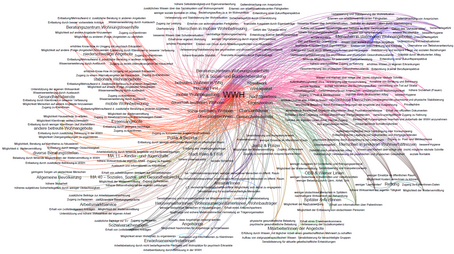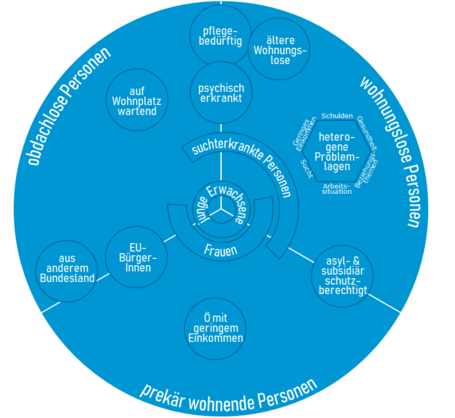Impact Analysis of the "Wiener Wohnungslosenhilfe"
Impacts and requirements of the “Wiener Wohnungslosenhilfe”
The “Wiener Wohnungslosenhilfe” (WWH) is a service facility funded by the public hand which comprises a wide range of services for people who are affected by homelessness, houselessness or precarious housing conditions. In addition to the classic services, such as emergency sleeping facilities and assisted housing, it also includes counselling services, health services and much more. The NPO & SE Competence Center was commissioned by the Dachverband Wiener Sozialeinrichtungen (umbrella organisation of Viennese social institutions) to conduct an impact analysis of the WWH. The objectives of the study were to work out the needs in homeless assistance and impacts of the WWH, taking into account the changed framework conditions of recent years. For this purpose, a qualitative approach was chosen by means of semi-structured interviews and focus groups, in which representatives of the services of the homeless assistance, external stakeholders as well as persons affected participated.
Impact map - impacts and social added value of Wiener Wohnungslosenhilfe
The presentation of all impacts of the Wiener Wohnungslosenhilfe services identified in this study in the form of an impact map according to Grünhaus/Rauscher (2020) shows a colourful, impressive picture. The impact map shows that homeless assistance has a broad impact on society and produces a variety of impacts on many different stakeholders. The colourful lines, starting from the organisation WWH itself in the middle and its services strung around, lead to the diverse impacts on clients as well as stakeholders, i.e. other (operational) organisations, companies, institutions and authorities as well as the general population. The large number of lines alone shows the dense network of effects and the great influence of the WWH.

The Impact Map - currently only available in German
...read more about stakeholders and their impact
Groups with demands of the Wiener Wohnungslosenhilfe
Homelessness occurs in many different forms. The "European Typology of Homelessness and Housing Exclusion” ETHOS defines these roughly and served as a starting point for the analysis. Despite all heterogeneity, however, all groups have one essential need: affordable, readily available housing.

Demand groups
© Own depiction
More about demand groups
Recommendations for action
In summary, there are four generalised main recommendations. Firstly, there is a need for more prevention work; secondly, there is a need for more public relations work and lobbying to improve the framework conditions for people potentially affected by homelessness or housing exclusion. Thirdly, there needs to be an expansion of offers of decentralised small housing units or flats with long-term perspectives for the residents, and fourthly, more individual solutions should be permitted.
Overall conclusion
The impact of how well or poorly our society succeeds in integrating people in distress or problematic situations into society can be seen in homeless assistance. It shows how high the unemployment rate is, whether a minimum wage is enough to live on, how widespread mental or addictive disorders are in society, how disadvantaged groups such as people with a migration background are cared for, how expensive housing is, and so on. If the services offered by a service facility such as the Wiener Wohnungslosenhilfe can respond adequately to the respective challenges, both quantitatively and qualitatively, social security and social cohesion in the city will be strengthened. The impact map drawn up in the context of the study shows very clearly how valuable the WWH is not only for the clients concerned, but ultimately brings clear benefits to a large number of organisations, companies, institutions and authorities, especially in terms of relief and cost savings. The high quality of life in the city of Vienna is thus also significantly related to the activities of the services provided by the Wiener Wohnungslosenhilfe and their impact.
